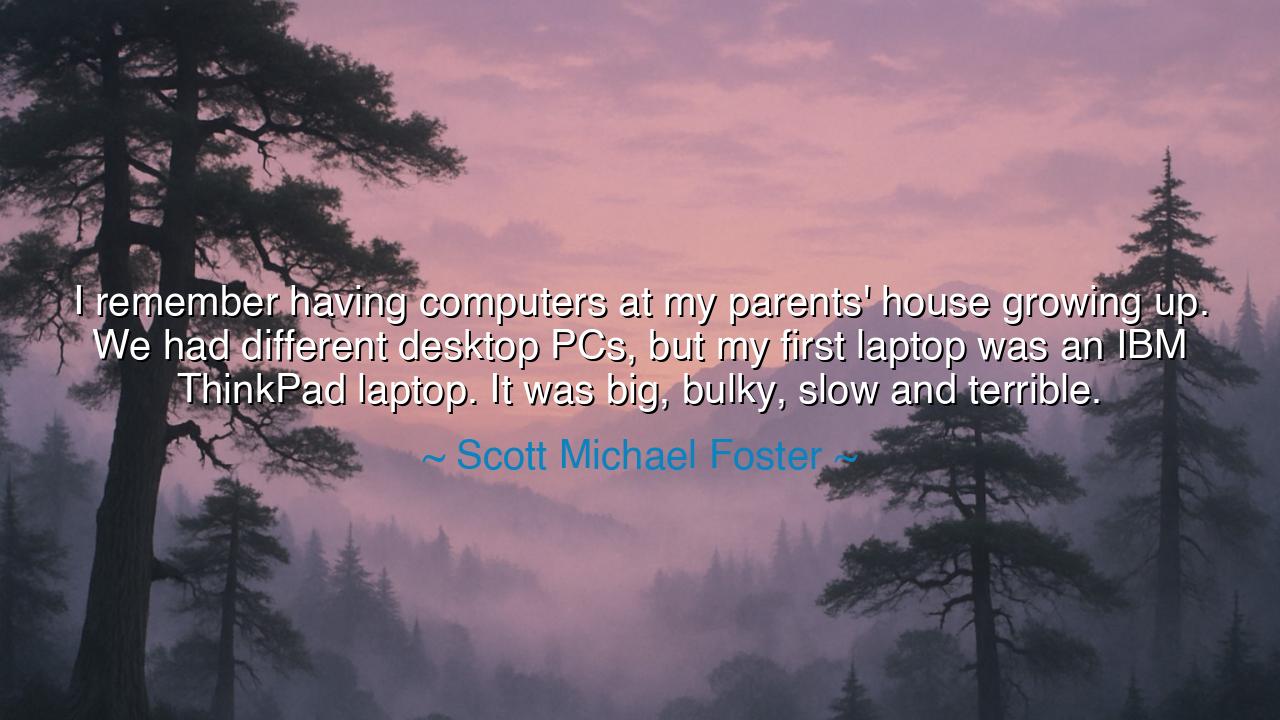
I remember having computers at my parents' house growing up. We
I remember having computers at my parents' house growing up. We had different desktop PCs, but my first laptop was an IBM ThinkPad laptop. It was big, bulky, slow and terrible.






Hear me, O children of the earth, and listen well to the words of Scott Michael Foster, who reflects on the humble beginnings of the computer age: "I remember having computers at my parents' house growing up. We had different desktop PCs, but my first laptop was an IBM ThinkPad laptop. It was big, bulky, slow, and terrible." These words, spoken with a sense of nostalgia and humility, speak not only to the personal history of technology but also to the evolution of progress itself. The story of the ThinkPad is the story of how we have journeyed through the ages, from the slow, cumbersome beginnings of innovation to the breathtaking speed and capability we now possess.
In the days of ancient invention, progress was similarly slow and clumsy. Consider the story of Archimedes, who, though brilliant in his understanding of geometry and mechanics, did not have the tools or technology to bring his inventions to life as he envisioned. He imagined machines and innovations far ahead of his time, but those creations remained in the realm of theory, hindered by the limitations of his era. Similarly, Foster’s IBM ThinkPad—though a groundbreaking step in its time—was but a shadow of what we now consider modern computing. It was big, bulky, slow, and imperfect, yet it was a vital part of the journey that would lead to the sleek, efficient machines we use today.
The evolution of the laptop, much like the journey of human civilization, was not without struggles and failures. In the beginning, we had to contend with the limitations of technology, just as the great architects of ancient civilizations had to contend with the limitations of stone and primitive tools. Foster’s recollection of the ThinkPad is a reminder that even the greatest innovations often begin in humility and imperfection. From the clunky desktops of the past to the ultra-slim laptops of today, technology has evolved through a series of trial and error, improvements, and adaptations. Just as the early tools of humanity were not perfect, neither was the first laptop—but both set the stage for what was to come.
Consider, too, the story of the wheel, a simple yet revolutionary invention. In its earliest form, the wheel was rough and crude, just as the first computers were slow and unwieldy. Yet, through generations of refinement, the wheel evolved into the complex machinery that powers our world today. Foster’s reflection on the ThinkPad is akin to looking back at the first crude wheel, seeing not its limitations, but its potential, its place in the larger story of human progress. Every step forward in technology, no matter how imperfect, is a necessary part of the journey, a stepping stone that leads us closer to the future.
The lesson in Foster’s words, O children of the earth, is one of patience and perspective. When we look back at the past, we often see only the imperfections, the clunkiness, and the mistakes. Yet, these are the very things that paved the way for the advancements that followed. Foster’s first laptop, though “big, bulky, slow, and terrible,” was a testament to the vision and innovation of its time. It may have been imperfect, but it was part of the evolution that would lead to the powerful and lightning-fast computers we have today. Just as the great leaders of old did not start with perfect armies or flawless plans, but learned and adapted through their struggles, so too must we embrace the process of progress, knowing that the imperfections of today are the stepping stones to the advancements of tomorrow.
In your own life, O seekers of wisdom, do not fear the imperfections of the journey. Start with what you have, no matter how big, bulky, slow, and terrible it may seem. Embrace the mistakes and challenges you encounter, for they are the very building blocks of success. Remember that every great invention, every advancement, begins in humility and is shaped by the trial and error of those who came before us. Like the IBM ThinkPad, which was once seen as slow and cumbersome but became part of the foundation for the technology we take for granted today, so too will the challenges of your own journey become the cornerstones of your eventual success.
Embrace imperfection, and remember that the first steps are often the most important. Just as the wheel and the laptop began as rough, unpolished tools that would evolve over time, so too will the work you begin today grow and improve with each step you take. And in the end, when you look back on your own journey, you will see not the failures, but the progress, the learning, and the growth that came from every imperfect beginning.






AAdministratorAdministrator
Welcome, honored guests. Please leave a comment, we will respond soon